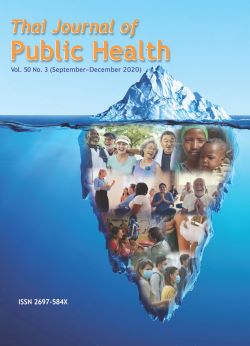Family Function among People with Schizophrenia in a Community Context, Kalasin Province, Thailand
Keywords:
Family function, Schizophrenia, Community contextAbstract
Schizophrenia is a chronic disease that can affect family function. A person who has schizophrenia usually has self-care deficit and some health risk behaviors such as violence, and alcohol and substance use, which trouble family members in terms of both body and mind, including family functioning. The family needs to adjust to a new function that could serve all family members’ needs. However, most previous studies were focused on screening and describing general family functioning, and they had limitations regarding the understanding of family function among people with schizophrenia specifically. Thus, this study aimed to explore family function among people with schizophrenia who were living within the vicinity of Nong So Health Promoting Hospital, Lam Pao Subdistrict, Muang District, Kalasin Province, Thailand. The target population consisted of 30 families who lived in the community. The research instrument was a structured interview with open-ended questions which was developed based on Friedman, Bowden and Jones’s family function concept, literature review and situational analysis. Content validity was checked by 5experts, and the resulting content validity index was 0.92. The tool was tried out with 10 similar families. The reliability of Cronbach's coefficient was 0.97. Data were collected via an interview. Quantitative data were analyzed by using descriptive statistics: frequency, mean and standard deviation. Content analysis was used for analysis of data from open-ended questions.
The study found that total mean score of family function among people with schizophrenia was good (= 3.15, SD = 0.68). In terms of aspects of family function, the highest mean score was response to basic needs: good level (= 3.49, SD = 0.89). The lowest mean score was for the family coping and solving problems function: moderate level ( = 2.87, SD = 0.80). The highest mean scoring item was caring, supplying, and cooking for someone with schizophrenia (= 3.73, SD= 0.74). Secondly, talking with someone with schizophrenia was within the good level (= 3.67, SD= 0.75). The third level was socializing, monitoring and directing someone with schizophrenia to take medicine on time and following-up with appointments (=3.60, SD= 1.03).
The content analysis of data from open-ended questions showed that the families performed more talking about day to day living with schizophrenia (17 families). They had exerted more control and given warning about alcohol drinking, smoking and drug abuse (16 families), and made merit for reducing suffering and wishing for a good life in the future (15 families). The least functioning practice was giving money for sick people to buy food and drinks during the day (3 families). They also did less monitoring of abnormal behaviors and symptoms of schizophrenia. Additionally, they sought less knowledge for caring for someone with schizophrenia (2 families). They also undertook fewer measures to protect the person with schizophrenia from risk, and fewer measures to protect them from harming other people in the community (2 families).
In conclusion, family function among people with schizophrenia was classified as good. Family coping and problem-solving function was at a moderate level. The functional aspect of seeking knowledge for providing care and monitoring the family member who had schizophrenia was at a low level. Future studies should focus on developing capacity of a family’s functioning in problem solving and coping, seeking more knowledge, and monitoring behaviors, and abnormal symptoms. For health policy, the health care system should provide care and support to families to ensure readiness before the discharge of their family member. Long term care, support and monitoring should be provided for the family in the primary care setting.
References
2. World Health Organization. Schizophrenia [database on the Internet]. 2019 [cited 2019 Mar 23]. Available from: https://www.who.int/news-room/fact-sheets/detail/schizophrenia.
3. Kalasin Provincial Statistical Office. Kalasin provincial Statistical Report: 2017 [database on the Internet].2019 [cited 2019 Mar 23]. Available from: http://kalasin.nso.go.th/index.php?option=com_content&view=article&catid=80&id=190.(in Thai).
4. Department of Mental Health. Annual report department of mental health fiscal year 2018. Bangkok: Lamom Publishing Co., Ltd.;2018 (in Thai) .
5. Office of the National Economics and Social Development Council .The Twelfth National Economic and Social Development Plan (2017-2021) [database on the Internet]. 2017 [cited 2017 Fed 3]. Available from: https://www.nesdc.go.th/ewt_dl_link.php?nid=6422.
6. Ganguly K, Chadda R, Singh B. Caregiver Burden and Coping in Schizophrenia and Bipolar Disorder: A Qualitative Study. American Journal of Psychiatric Rehabilitation, 2010; 13(2): 126 -142.
7. Hussein H. Family Functioning among Caregivers of Patients with Schizophrenia in Baghdad city. Karbala J. Med,2012; 5(1): 1204-1210.
8. Tan S, Yeoh A, Choo I, Huang A, Ong S, Ismail H, Ang P, Chan Y. Burden and coping strategies experienced by caregivers of persons with schizophrenia in the community. Journal of Clinical nursing, 2012; 21 (17‐18): 2410-2418.
9. Epstein N, Baldwin L, Bishop D.The McMaster Model of Functioning. Journal of marriage and family counseling, 1978; 40 (4):19-31.
10. DeSousa A. Family Functioning in Schizophrenia: A Clinical Study. Paripex Indian journal of research,2014; 3(9): 114-117.
11. TrangKhasombut U. Family therapy and family counseling. Bangkok: Family Research and Development Center; 1997.
12.Thongkam A. Family Function as Perceived by Person with Relapsed Schizophrenia [master’s independent study]. Chiang Mai: Chiang Mai University; 2003. (in Thai).
13. Krinnoi S. Selected Factors Related to Family Functioning as Perceived by Family Caregivers of Schizophrenia Patient [master’s thesis]. Bangkok: Chulalongkorn; 2012. (in Thai).
14. Friedman MM, Bowden VR, Jones EG. Family nursing: Research, theory, & practice. 5th ed. New Jersey: Pearson Education; 2003.
15. Lazarus RS, Folkman S. Stress, appraisal, and coping. New York: Springer Publishing Company; 1984.
Downloads
Published
Issue
Section
License
Creative Commons License CC-BY-ND


